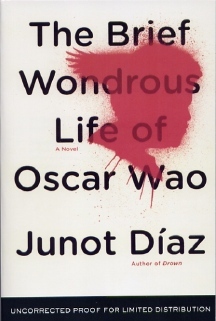You've heard the phrase "larger than life." No one would use
that term to describe Oscar Wao, or even the justly lauded novel bearing
his name. Here is a man -- an overgrown boy more precisely -- whose
very absence of ambition, bravado, adventure, and (yes) life defines
him, like the negative space in the center of a doughnut. He is fat.
He is nerdly. He is demure. He is a dreamer. He is who nobody wants
to be, but who everyone fears they could become. He is also, at the
end of his brief, wondrous life as vividly told by his best friend Yunior,
a brave, gentle soul, whose actions reveal the humanity in the quietly
steadfast. And that is almost enough to turn this book, a virtuoso first
novel from Junot Diaz, into an instant classic. If (like its eponymous
hero) it falls short of greatness, it nevertheless reminds us how small
the rest of the world is.
The book begins, like Kill Bill (another genre smashup), auspiciously
enough with a laughably serious sci-fi quote: "Of what import are
brief, nameless lives . . . to Galactus??" Diaz follows with a
high-brow excerpt from poet Derek Walcott: "Christ have mercy on
all sleeping things! From that dog rotting down Wrightson Road to when
I was a dog on these streets . . . I have Dutch, nigger, and English
in me, and either I'm nobody, or I'm a nation." And that, more
or less, previews the novel's tone: a teetering balance of high and
low, comic book and Shakespeare, nerd-dom and Third-World politics.
The theme of alienated adolescents fantasizing about mutant powers shares
the same pages as that of immiserated, impotent minorities trapped in
sub-tropical tyrannies. Diaz focuses on the Dominican Republic, the
home of the Leons, expatriates whose ancestors were decimated by the
brutal dictator Rafael Trujillo and who now live in (where else?) New
Jersey, where the last male scion spends his days watching anime, reading
fantasy, orchestrating role playing games, and writing an endless sci-fi
epic.
Oscar, appellated Wao after his abiding love for Doctor Who,
takes after another comic novel hero, Ignatius J. Reilly of 'A Confederacy
of Dunces'. He is a man of girth and stunted sexuality sublimated into
baroquely stilted verbiage, uttering salutations such as "Hail
and well met," intoning gravely after a jog "I shall run no
more," and wondering whether orcs "at a racial level"
imagine themselves to look like elves. The narrative, voiced by a room
mate from college, places him at the center of the story, but the novel
circles through time, sketching a family history reaching into the post-war
past of the Dominican Republic and the origins of the Leons' terrible
fall. Thus, the viewpoint switches to Oscar's sister, then his mother,
grandfather, then back again to "the Dominican Tolkien."
The family member's destinies purportedly trace a "fuku" or
curse, stretching across time and space. The reader can observe Diaz
striving for a flavor of magical realism: Isabel Allende meets Gabriel
Garcia Marquez. But, it is one ingredient too many in this heady Caribbean
brew. He supplies a couple coincidences and visions that lend themselves
to an otherworldly interpretation, but the story's heart simply isn't
in it. This is a character study; almost a short story collection of
interrelated life vignettes. In its attention to detail and the sympathy
afforded each character, the novel merits comparison with the intimate
short work of Alice Munro. At the same time, Diaz can muster a prose
so bleak as to be drawn from a Cormac McCarthy novel:
At one point they passed through one of those godforsaken blisters of
a community that frequently afflict the arteries between the major cities,
sad assemblages of shacks that seem to have been deposited in situ by
a hurricane or other such calamity. The only visible commerce was a
single goat carcass hanging unfetchingly from a rope, peeled down to
its corded orange musculature, except for the skin of its face, which
was still attached, like a funeral mask. He'd been skinned very recently,
the flesh was still shivering under the shag of flies.
Unfortunately, the stories are so individually strong that they exert
a centrifugal force on the central narrative, resulting in a less-than-dynamic
pace and plot.
While the realism and lack of sustained ambiguity keep the atmosphere
natural,
the real wonder here is the narrator, a consummate verbal showman who
recombines Dominican Spanish and American English into a stream of vibrant
sound and sense, rhythm and rhyme. Like Arundhati Roy or early Salman
Rushdie, Diaz explores the fringes of natural sound and language, delighting
in a childlike play with the skin of thought. The conversational discourse
employs copious use of footnotes, strewn at times in short bursts of
thought confetti and at others in long, winding discourses on minor
character backgrounds and Dominican history. Diaz demonstrates a technical
mastery here that was rightly commended; his youthful, player-narrator
could, without just the right balance, very easily have sounded like
a puff-chested caricature of Caribbean machismo. In its studied effortlessness,
the novel recalls A Heartbreaking Work of Staggering Genius, the work
of an author who also received a Toronto blessing of adulation with his
debut, only later to be reprimanded for indulging in style at the expense
of substance, and then even later redeemed by a "straight"
story about an African child refugee.
This is a book that tugs at you, wears down your defenses. At once supremely
silly and profoundly serious, it is a book running on fumes and adolescent
adrenaline that keeps going because it never condescends to the reader
and consistently sustains an aura of authenticity. In its preoccupation
with the effluvia of marvelous pop fiction, it is also a love letter
to the past 30 years of American culture before the Internet revolution
and the i-pod generation, when our entertainments were a little less
hi-tech and yet (by virtue of raw imagination) more fully realized than
ever since.
